- Home
- Articles | Microsoft
- Microsoft Windows XP Updates
Microsoft Windows XP Updates A Simplistic Description
Stephen Harrison B.Sc. (Hons), M.Sc., MBCS, CITP
Microsoft Windows XP Updates are a fact of life! Without them, Microsoft operating systems and supported software remain vulnerable to Malware and Viruses.
This is the 1st of a 2 part tutorial on Microsoft Windows XP Updates. Do you recognize the icons and messages that appears in your System Tray (near your clock in the bottom right-hand corner of your screen)?
IMPORTANT NOTICE
Windows XP has gone End of Life (EOL) on April 8th 2014. This means no further security patches or updates for this Operating System. My advice is to move to the latest operating system version as soon as possible
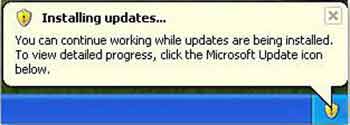 Microsoft Windows XP Updates
Microsoft Windows XP UpdatesSystem Tray Installing New Updates Message
Keep up with the latest news and developments
Sign up to the eComputerZ Newsletter
The free A to Z of performing BIOS updates guide that anyone can follow.
✔ A checklist of important actions to perform throughout the update process.
✔ Further supporting information to aid your update plans.
✔ My unique approach for sourcing the latest BIOS versions for any motherboard manufacturer.
Sign up below for instant access to the guide, or by going to the Subscription page for more details.
I never share information with third parties and your details are secure.
I aim to issue newsletters at the start of each month.
Home computer users like us may recognize the icons and messages, but know very little about the significance behind them. Therefore, Part 1 of this tutorial series aims to:
- Explain Windows updates - What they are and why we need them
- Describe the types of patches Microsoft issue
- Explain the Microsoft Windows Update Severity Rating System
- Describe the Microsoft Security Update release policy - Which patches are updated and when
Part Two compliments the bigger picture described here by walking you through the practical choices and actions to ensure your computer is appropriately protected.
Contents
What Are Windows XP Security Updates?
Microsoft Windows XP Updates are packages of software regularly issued by Microsoft to correct errors in Windows XP, so the operating system is not exploited by online cyber criminals.
Microsoft also release non-security patches to improve various elements of Windows XP, such as performance and functionality, i.e. make your machine run better and do things you need it to do.
Windows XP was released in 2001 with lots of bugs in it. There are over 40 million lines of code that make up Windows XP, according to estimates online (no one knows for certain).
Therefore, it is not too surprising that some of this code is incorrect. Even a Company the size of Microsoft can't test every single thing to 100% accuracy before releasing!
Automatics Updates apply the software packages issued by Microsoft to fix the broken code/bugs/vulnerabilities, protecting you from Viruses that exploit these vulnerabilities, and enhance your user experience.
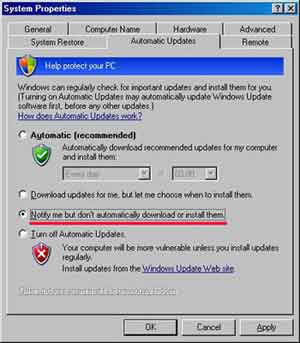 Microsoft Windows XP Updates
Microsoft Windows XP UpdatesAutomatic Updates Options
The Automatic Updates Service checks the Microsoft Windows Update Servers every day for new patches.
If any patches are required by your computer, Windows XP can download and install these for you automatically, without any intervention by you.
You can also be notified before downloading the software packages.
To change your automatic updates settings, click Start > Settings > Control Panel, then double left-click the Automatic Updates option.
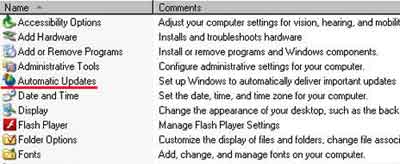 Microsoft Windows XP Updates
Microsoft Windows XP UpdatesControl Panel Automatic Updates
The Automatic Updates Service also modifies the download speed of the required patches so as not to impact on your computer activities.
This means you shouldn't notice any changes to your computer's performance or Internet Speed when patches are being downloaded to your computer.
The protocol that makes all this possible is called the Background Intelligent Transfer Service (BITS).
It is worth noting that Windows Updates were once a manual process. When Windows 95 was released, the only way you could keep your computer patched was to download manually from a Microsoft Website.
The Critical Update Notification Utility that come with Windows 98 prompted you to either install the patches for your machine, or defer by 24 hours.
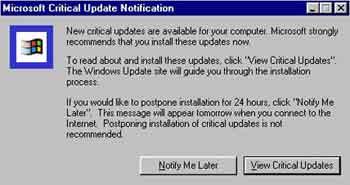 Microsoft Windows XP Updates
Microsoft Windows XP UpdatesPre-Windows XP Critical Update Notification
The Automatic Updates Service that comes with Windows XP is a much enhanced approach to keep your computer as secure as possible.
Next we look at the different types of patches Microsoft issue.
Return to the Table of Contents
What Types Of Updates Does Microsoft Issue?
Microsoft Windows XP Updates are increasingly varied in nature and type.
Microsoft can issue the following types of patches to home computer users:
- Security Updates
- Critical Updates
- Definition Updates
- Critical Drivers
- Service Packs
- Update Roll ups
Windows XP Security Updates are released globally by Microsoft to fix a specific security-related bug for a specific Microsoft program.
For example, a security update could be released to fix a flaw in the Operating System, or a Microsoft program such as Office.
These types of Microsoft updates for XP have a severity rating, based on the seriousness of the identified bug.
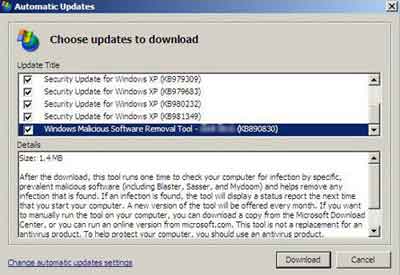 Microsoft Windows XP Updates
Microsoft Windows XP UpdatesAutomatic Updates Identified for Download
Critical Updates are released to all Microsoft Windows XP users to fix critical bugs that are non-security related.
For example, in 2004, when you download Windows XP SP2, you could encounter installation issues if your computer's BIOS did not support Pentium IV processors.
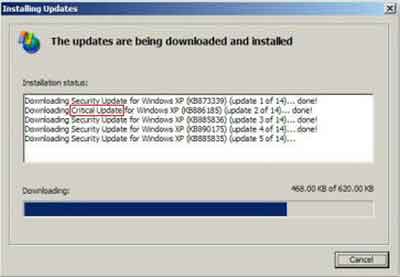 Microsoft Windows XP Updates
Microsoft Windows XP UpdatesCritical Updates Downloading
Definition Updates are the latest releases of things like pattern files for products such as the Microsoft Security Essentials.
They ensure your computer is protected as much as possible.
Critical Drivers are optional driver updates detected for your computer. This is Microsoft's attempt at keeping your computer running smoothly.
My Personal View is to avoid installing Windows XP driver updates. Instead, go to the manufacturer's website and use their drivers instead. They tend to be more stable and comprehensive.
Service Packs are a combined batch of all the patches previously explained in a single software package.
They keep Windows XP and other Microsoft products current. This is to avoid further problems in the future. They can also include feature changes to improve performance and give users more choice.
For example, Microsoft Windows XP Service Pack 3 includes more options for securing wireless network connectivity. For more details, take a look at the Windows XP SP3 download page.
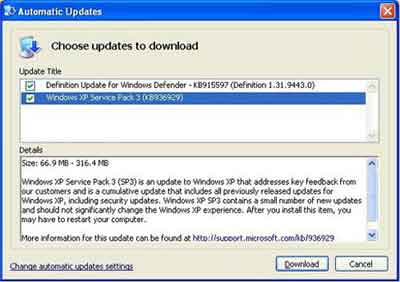 Microsoft Windows XP Updates
Microsoft Windows XP UpdatesService Pack 3 Download Option
Update roll ups are like mini Service Packs. They combine batches of updates of a specific type, e.g. Security, to address specific issues with a specific program.
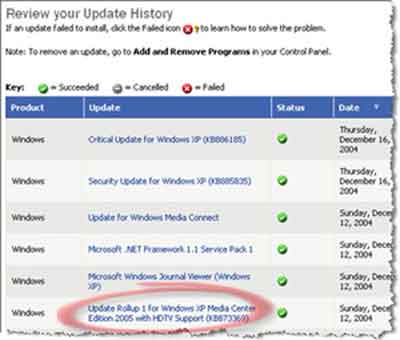 Microsoft Windows XP Updates
Microsoft Windows XP UpdatesUpdate Rollup
The next section briefly discusses the Microsoft Security ratings for Security updates.
Return to the Table of Contents
Microsoft Windows Update Severity Rating System
Microsoft Windows XP Updates are essential to fix the thousands of vulnerabilities that are disclosed each year.
Microsoft's Severity Rating System is really to help IT professionals determine which patches to issue in what order across the Organizations they support.
Therefore, we are not going to spend a lot of time on this topic. However, it is worth home computer users being aware of what Microsoft have in place to help get urgent updates installed ASAP.
The table below shows you the Ratings and Definitions Microsoft use to classify their Security updates. The "Your Action" column is my view on what you should do when you are alerted to new patches.
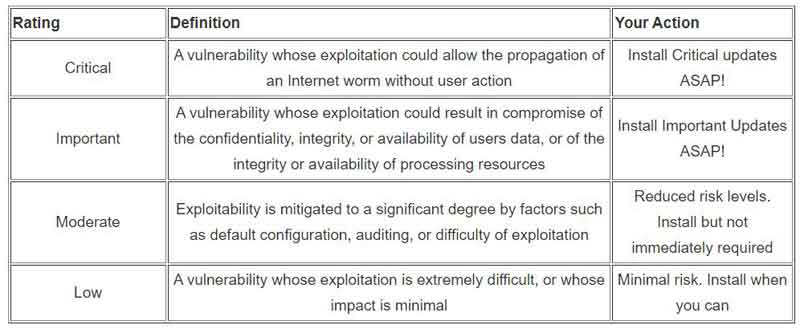 Microsoft Windows XP Updates
Microsoft Windows XP UpdatesSeverity Rating Table
The final section looks at the Microsoft Update Release Policy.
Return to the Table of Contents
Microsoft Security Update Release Policy
Microsoft issues critical patches every second Tuesday of each month. This is known in the IT industry as Patch Tuesday.
Microsoft also releases other patches on the intervening Tuesdays. These patches tend to be definition updates, and security updates that have a Low Severity Rating.
However, Microsoft will release critical and important updates outside of Patch Tuesday if required. These are often known in the IT industry as Out Of Band patches.
An example of this was on Thursday 29th December 2011, which Microsoft released a critical update to address a bug which allows cyber criminals to issue Denial Of Service (DoS) attacks.
A DoS attack is where the cyber criminal sends lots of 'requests' of the Server or Service, causing it to crash.
They use Operating System vulnerabilities and supporting software to execute their attacks.
It is reported that Microsoft decided on the Patch Tuesday strategy to help Companies to organize themselves and conduct their testing before releasing the patches to all their computers.
However, it is also reported that cyber criminals use this monthly release of critical updates to plan their attacks.
Issuing their latest Malware the day after Patch Tuesday means it has the longest amount of time to infect before a patch is issued.
Return to the Table of Contents
Microsoft Windows XP Updates | Final Thoughts
Microsoft Windows XP updates are essential for keeping your system up to date and secure. There are many criminals online ready to exploit the bugs that are known about.
To conclude this page, I include a few links I think are useful and informative:
Microsoft Brochures, Fact Sheets, and Tip Cards offers lots of advice from Microsoft on how to keep you and your family secure when online.
To read more about the Denial of Service attack referred to above and patch Microsoft issued, take a look at this Security Week article (Note:- This is very technical!).
Part two, Microsoft XP Updates, will walk you through the Microsoft Windows Update process.
- Home
- Articles | Microsoft
- Microsoft Windows XP Updates
